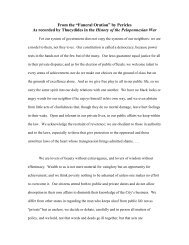Rousseau_contrat-social
You also want an ePaper? Increase the reach of your titles
YUMPU automatically turns print PDFs into web optimized ePapers that Google loves.
the general will; the latter considers only the common interest, while<br />
the former takes private interest into account, and is no more than a<br />
sum of particular wills: but take away from these same wills the pluses<br />
and minuses that cancel one another,[7] and the general will remains as<br />
the sum of the differences.<br />
If, when the people, being furnished with adequate information, held its<br />
deliberations, the citizens had no communication one with another, the<br />
grand total of the small differences would always give the general will,<br />
and the decision would always be good. But when factions arise, and<br />
partial associations are formed at the expense of the great association,<br />
the will of each of these associations becomes general in relation to<br />
its members, while it remains particular in relation to the State: it<br />
may then be said that there are no longer as many votes as there are<br />
men, but only as many as there are associations. The differences become<br />
less numerous and give a less general result. Lastly, when one of these<br />
associations is so great as to prevail over all the rest, the result is<br />
no longer a sum of small differences, but a single difference; in this<br />
case there is no longer a general will, and the opinion which prevails<br />
is purely particular.<br />
It is therefore essential, if the general will is to be able to express<br />
itself, that there should be no partial society within the State, and<br />
that each citizen should think only his own thoughts:[8] which was<br />
indeed the sublime and unique system established by the great Lycurgus.<br />
But if there are partial societies, it is best to have as many as<br />
possible and to prevent them from being unequal, as was done by Solon,<br />
Numa and Servius. These precautions are the only ones that can guarantee<br />
that the general will shall be always enlightened, and that the people<br />
shall in no way deceive itself.<br />
4. THE LIMITS OF THE SOVEREIGN POWER<br />
IF the State is a moral person whose life is in the union of its<br />
members, and if the most important of its cares is the care for its own<br />
preservation, it must have a universal and compelling force, in order to<br />
move and dispose each part as may be most advantageous to the whole. As<br />
21











